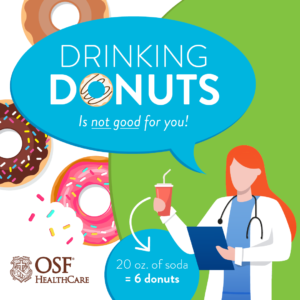
Improve your health during No Soda November
Too much sugar in your diet?
Unless you’ve been living alone and completely off the grid for the past 50 years, you surely have heard this: Added sugars in soft drinks are bad for you.
Actually, added sugars in any food or beverage can harm you. Too much sugar contributes to a pile of health problems, including obesity, diabetes and heart disease.
But when it comes to overloading your system with sugar, nothing is more effective than a regular soda. Think of it as a sugar bomb attack on your body.
“It’s crazy. You think it’s just a drink, it can’t be that bad. It’s harmless,” said Rebecca Baumann, MD, a cardiologist for OSF HealthCare Cardiovascular Institute. “You’re thirsty, so you drink. Before you know it, you’ve consumed as much sugar as in a whole box of donuts.”
She does not exaggerate. One 20-ounce bottle of regular soda – and be honest, who drinks just one? – contains about 65 grams of sugar. That’s the same amount as you would consume eating six glazed donuts.
Added sugar has no nutritional value
Sugar plays an important role in our daily function. Your body converts the sugar you eat and drink into energy.
Your body gets sugar from two sources. Natural sugars are found in produce such as whole fruits and vegetables, as well as dairy products such as milk and cheese. Added sugars range from what you drop into your coffee, tea and cookie recipes to ingredients in food coloring, preservatives and candy – and, of course, the sweeteners in soda and even so-called sports drinks.
“You get all the sugar you need from natural sugars, along with all the other nutrients that are in those foods,” Dr. Baumann said. “Added sugar has no nutritional value. And it adds up a lot more quickly.”
The American Heart Association recommends limits of 6 teaspoons (about 24 grams), of added sugar per day for women, and 9 teaspoons (about 36 grams) for men.
It doesn’t take much to reach those limits. One glazed donut contains 10 grams of sugar. A single-serving packet of cocoa mix packs 20 grams. And a 12-ounce can of cola pours about 39 grams into your body.
Dangers of too much sugar
All that sugar adds up to a lot of potential health problems, starting with obesity. Added sugars pack a lot of calories. More than 70% of Americans are considered overweight, in large part due to added sugars.
“Too much sugar overworks your pancreas, which eventually gives up and stops making enough insulin,” Dr. Baumann said. “It also causes liver disease, which can eventually evolve into cirrhosis. Non-alcoholic fatty liver disease, or NAFLD, can result from excessive fructose consumption. NAFLD, hypertension and diabetes are all interlinked and part of what we refer to as ‘metabolic syndrome.’
“Diabetes and hypertension are both extremely common risk factors we see with atherosclerotic disease – hardening of the arteries. Your heart is affected. Your entire cardiovascular system is affected. Added sugar is a major player.”
Make a plan to eliminate added sugar
One of the best things you can do for your health is eliminate – or at least greatly reduce – your intake of added sugars. One way to do that – and to see positive results – is cut back on soft drinks.
The American Heart Association endorses a campaign known as No Soda November. Take it as a challenge. If you need incentive, consider this: Replacing just 12 ounces of soda with 12 ounces of water each day, you’ll cut more than 50,000 calories in a year. That’s 15 pounds.
If stopping cold turkey is too much for you, work out a plan to taper off throughout the month. Make your goal to be soda-free by the time November ends.
The tough part is reducing your body’s craving for sugar.
One way is to eat fresh fruits and vegetables. Guacamole and humus are healthy, too. These kind of foods provide natural sugar, which the body absorbs slowly.
Diet sodas, watered down juices and green herbal teas can help you get started, but be careful. They might have other consequences.
For example, many artificial sweeteners are actually sweeter than table sugar and will increase the desire for sweets. Some even interfere with fat metabolism and lead to weight gain. Studies have shown a significantly increased risk of developing metabolic syndrome or diabetes in people who drink artificially sweetened beverages every day.
“Water is the best, but substitutes can help you taper down gradually,” Dr. Baumann said. “Chocolate milk can contain a lot of sugar, but is much better than soda, as it also contains several other important nutrients. And you can gradually cut back on the amount of cocoa powder.
“Using flavored powders in water can also help you gradually reduce the amount of added sugar or sweetener. Over time, you can lose your taste for sugar and your craving will decrease. That’s the state you want to reach, where you simply don’t want it anymore.”
